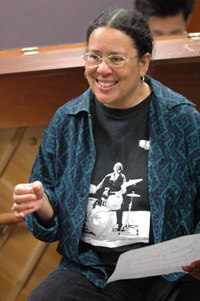Don't see what you're looking for?
Main Site
Berklee.eduCampuses and Schools

Phil Farnsworth
Carolyn Wilkins
For media inquiries, please contact Media Relations
Carolyn Wilkins is a professor in the Ensemble Department at Berklee College of Music. She is an accomplished jazz pianist, composer, and vocalist whose performance experience includes radio and television appearances with her group SpiritJazz, a concert tour of South America as a jazz ambassador for the U.S. State Department, performances with the Pittsburgh Symphony as a percussionist under André Previn, and shows featuring Melba Moore, Nancy Wilson, and the 5th Dimension. Wilkins has performed at Boston's Regattabar, Scullers Grille, the Boston Globe Jazz Festival, and the Many Colors of a Woman Jazz Festival.
Wilkins is the author of Tips for Singers: Rehearsing, Performing, and Auditioning, They Raised Me Up: A Black Single Mother and the Women Who Inspired Her, Damn Near White: An African American Family’s Rise from Slavery to Bittersweet Success, and Melody for Murder: A Bertie Bigelow Mystery.
- Former faculty member at New England Conservatory of Music and Tobin Community School
- Former lecturer at Emerson College, Emmanuel College, and Fitchburg State College
- Author of Damn Near White: An African American Family's Journey from Slavery to Bittersweet Success
- B.M., Oberlin Conservatory of Music
- M.M., Eastman School of Music
"Having gone to two major conservatories—Oberlin and Eastman—I learned how to survive in a really competitive environment. So I'm aware of what the students are going through here at Berklee. I've been a professional on the gigging scene in Boston since 1986 and in other places before that. I play the drums, the bass. I sing, I play the piano. I have to bring all that into the classroom because in an ensemble class, you're teaching a whole group of people, so you never know what tools you'll need. You bring your whole personality in there with you."
"In a Berklee ensemble, you get to play with the same group of people for 15 weeks in a guided situation in which you're continually being monitored and mentored. We all go out and play gigs on our own. I do that myself, and that's one level of learning. But the kind of feedback that you get from being in the ensemble can help you see the things that you do well, don't do well, and how you can improve them. It's an educational experience, not just jamming and getting together."
"I try to keep things informal but challenging, and very personal. By the end of the semester, I usually know each of my students pretty well. I try to push them but not in a way that makes them feel uncomfortable or picked on. We are on an undertaking together, and it's my job to try to bring out the best in them during the semester. We have ensembles at all different levels, and at each level there's a different expectation for the specific material. But I'd like the students to feel that they've not only learned about music at whatever level they're supposed to, but that they've learned something about themselves. On the surface, you're learning the songs, but you're also learning how to relate to other people, how to play with other people, how to handle people who might tick you off—you're learning about yourself and your own style of working."
